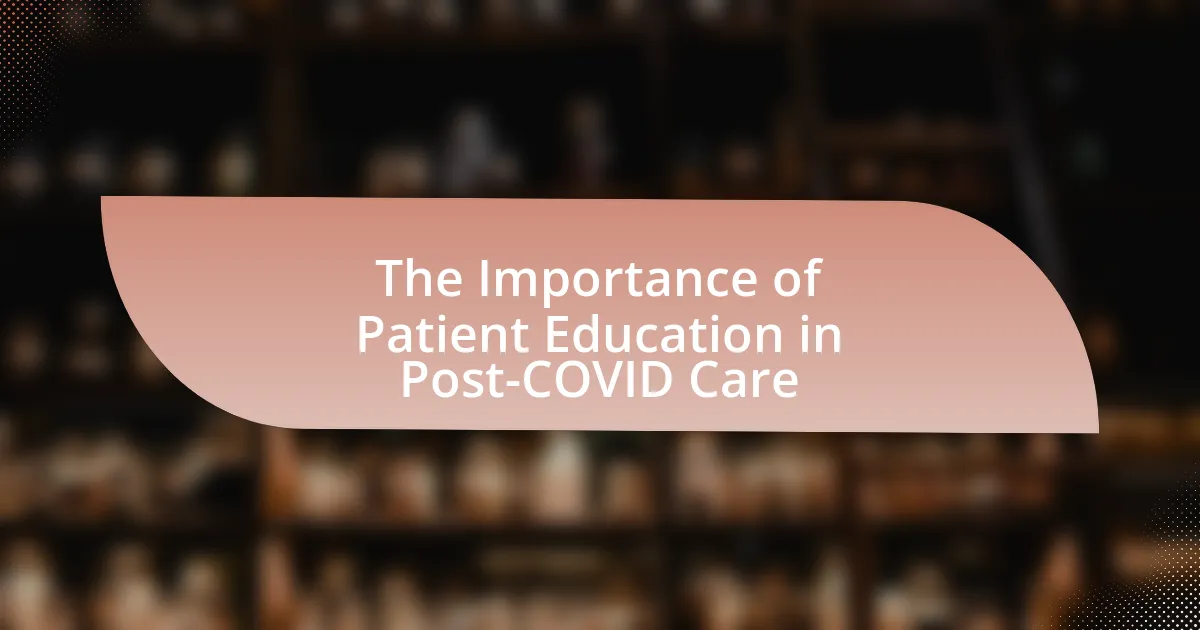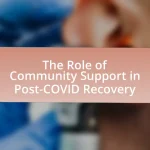Patient education is a critical component of post-COVID care, empowering individuals to effectively manage their health and prevent complications associated with lingering symptoms, often referred to as “long COVID.” This article outlines the significance of patient education in enhancing treatment adherence, symptom recognition, and self-management skills, which are essential for improving health outcomes. It discusses the specific challenges faced by post-COVID patients, the role of healthcare professionals in delivering effective education, and the best practices for implementing tailored educational strategies. Additionally, the article highlights the importance of clear communication, the use of technology, and the impact of support groups in fostering patient engagement and understanding.
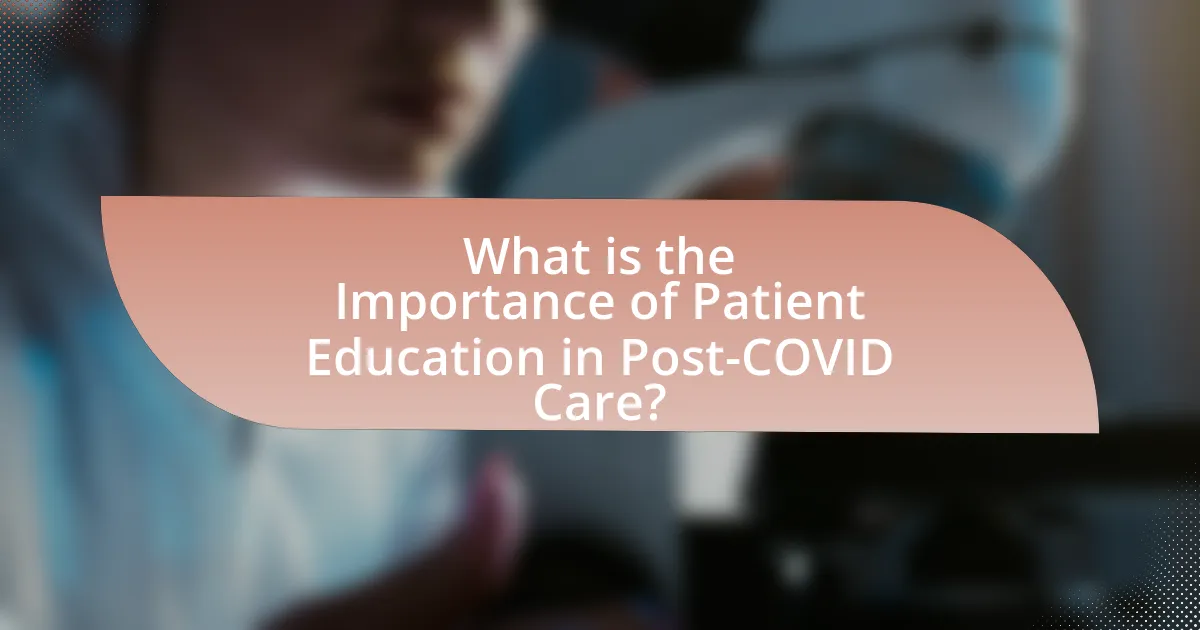
What is the Importance of Patient Education in Post-COVID Care?
Patient education in post-COVID care is crucial for empowering individuals to manage their health effectively and prevent complications. Educated patients are more likely to adhere to treatment plans, recognize symptoms of potential complications, and engage in preventive health behaviors. Research indicates that informed patients experience better health outcomes, as they can make knowledgeable decisions regarding their care, which is particularly important in the context of lingering symptoms and the potential for long-term effects of COVID-19. For instance, a study published in the Journal of Medical Internet Research found that patient education significantly improved self-management skills and health-related quality of life among post-COVID patients.
Why is patient education crucial in the context of post-COVID care?
Patient education is crucial in the context of post-COVID care because it empowers individuals to manage their health effectively and make informed decisions regarding their recovery. In the aftermath of COVID-19, many patients experience lingering symptoms, known as “long COVID,” which can include fatigue, respiratory issues, and cognitive difficulties. Educating patients about these potential outcomes enables them to recognize symptoms early, seek appropriate care, and adhere to recommended rehabilitation strategies. Studies indicate that informed patients are more likely to engage in self-management practices, leading to improved health outcomes and reduced healthcare costs. For instance, a study published in the Journal of Medical Internet Research found that patient education significantly improved adherence to treatment plans among individuals recovering from COVID-19.
What specific challenges do patients face after COVID-19?
Patients face several specific challenges after COVID-19, including persistent symptoms, mental health issues, and difficulties in returning to normal activities. Research indicates that approximately 10-30% of individuals experience long-term effects, known as “long COVID,” which can manifest as fatigue, respiratory problems, and cognitive impairments. Additionally, many patients report increased anxiety and depression due to the pandemic’s impact on their lives and health. A study published in the Journal of the American Medical Association found that 40% of COVID-19 survivors experienced psychological distress, highlighting the need for comprehensive post-COVID care and education to address these challenges effectively.
How does patient education address these challenges?
Patient education addresses challenges in post-COVID care by equipping patients with essential knowledge and skills to manage their health effectively. This education helps patients understand their conditions, treatment options, and the importance of adherence to prescribed therapies, which can lead to improved health outcomes. For instance, studies have shown that informed patients are more likely to engage in self-care practices, reducing hospital readmissions and enhancing recovery rates. Furthermore, patient education fosters better communication between healthcare providers and patients, allowing for tailored care plans that address individual needs and concerns.
What are the key components of effective patient education in post-COVID care?
The key components of effective patient education in post-COVID care include clear communication, tailored information, and ongoing support. Clear communication ensures that patients understand their health conditions and treatment options, which is crucial for adherence to care plans. Tailored information addresses individual patient needs, considering factors such as age, health literacy, and specific post-COVID symptoms. Ongoing support involves regular follow-ups and access to resources, which helps patients navigate their recovery process effectively. Research indicates that effective patient education can lead to improved health outcomes and increased patient satisfaction, highlighting its importance in post-COVID care.
What topics should be covered in patient education materials?
Patient education materials should cover topics such as disease management, medication adherence, lifestyle modifications, symptom recognition, and mental health support. These topics are essential for empowering patients to take an active role in their health, particularly in the context of post-COVID care, where individuals may experience lingering symptoms and require ongoing management. Research indicates that effective patient education can lead to improved health outcomes, as evidenced by a study published in the Journal of Patient Education and Counseling, which found that patients who received comprehensive education reported better adherence to treatment plans and a greater understanding of their conditions.
How can healthcare providers ensure the information is understandable?
Healthcare providers can ensure information is understandable by using clear, simple language and avoiding medical jargon. Research indicates that patients retain information better when it is presented in plain language, as evidenced by a study published in the Journal of Health Communication, which found that patients who received information in simplified terms had a 40% higher comprehension rate compared to those who received complex explanations. Additionally, utilizing visual aids, such as diagrams and charts, can enhance understanding, as visual learning has been shown to improve retention and clarity. Regularly assessing patient comprehension through teach-back methods, where patients explain the information back to the provider, further confirms understanding and allows for clarification of any misconceptions.
What role do healthcare professionals play in patient education?
Healthcare professionals play a crucial role in patient education by providing essential information and guidance that empower patients to manage their health effectively. They assess patients’ understanding of their conditions, explain treatment options, and clarify medication instructions, which enhances adherence to care plans. Research indicates that effective patient education can lead to improved health outcomes, as evidenced by a study published in the Journal of Patient Education and Counseling, which found that patients who received comprehensive education reported better self-management and satisfaction with their care.
How can healthcare professionals assess patient understanding?
Healthcare professionals can assess patient understanding through techniques such as teach-back, where patients explain back the information provided to them. This method allows healthcare providers to evaluate whether patients comprehend their diagnosis, treatment options, and care instructions. Research indicates that using teach-back can significantly improve patient understanding and adherence to medical advice, as evidenced by a study published in the Journal of Health Communication, which found that patients who engaged in teach-back demonstrated a 30% increase in understanding compared to those who did not.
What strategies can healthcare professionals use to enhance patient engagement?
Healthcare professionals can enhance patient engagement by implementing personalized communication strategies. Tailoring interactions to meet individual patient needs fosters a sense of connection and trust, which is crucial for effective healthcare delivery. Research indicates that personalized communication can lead to improved patient satisfaction and adherence to treatment plans, as evidenced by a study published in the Journal of Medical Internet Research, which found that patients who received tailored health information were more likely to engage in their care actively. Additionally, utilizing technology, such as patient portals and mobile health applications, allows for continuous communication and access to health information, further promoting engagement.
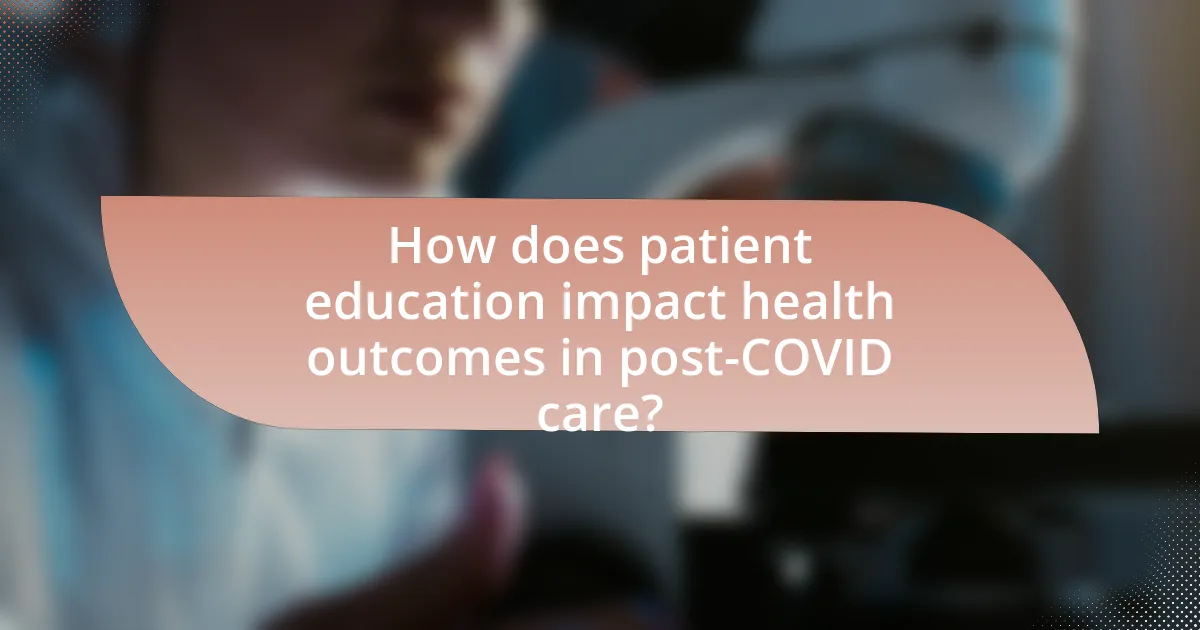
How does patient education impact health outcomes in post-COVID care?
Patient education significantly improves health outcomes in post-COVID care by enhancing patients’ understanding of their condition and self-management strategies. Educated patients are more likely to adhere to treatment plans, recognize symptoms early, and engage in preventive health behaviors, which can lead to reduced hospital readmissions and better overall health. Research published in the Journal of Medical Internet Research indicates that effective patient education interventions can lead to a 30% improvement in adherence to post-COVID care guidelines, demonstrating a clear link between education and health outcomes.
What evidence supports the effectiveness of patient education?
Patient education is effective in improving health outcomes, as evidenced by numerous studies demonstrating its impact on patient knowledge, adherence to treatment, and overall health status. For instance, a systematic review published in the Journal of Medical Internet Research found that patient education interventions significantly increased knowledge and self-management skills in chronic disease patients, leading to better health outcomes. Additionally, a study in the American Journal of Public Health reported that patients who received education about their conditions were more likely to adhere to prescribed treatments, resulting in reduced hospital readmissions. These findings underscore the critical role of patient education in enhancing health management, particularly in the context of post-COVID care.
How does improved patient knowledge influence recovery rates?
Improved patient knowledge significantly enhances recovery rates by enabling individuals to better understand their health conditions and treatment options. When patients are well-informed, they are more likely to adhere to prescribed treatment plans, engage in self-care practices, and recognize symptoms that require medical attention. Research indicates that patients with higher health literacy experience better health outcomes; for instance, a study published in the Journal of Health Communication found that increased patient knowledge correlates with improved adherence to medication regimens and a reduction in hospital readmissions. This evidence underscores the critical role of patient education in facilitating effective recovery processes, particularly in the context of post-COVID care.
What are the long-term benefits of patient education for chronic conditions post-COVID?
Patient education for chronic conditions post-COVID leads to improved self-management, enhanced health outcomes, and reduced healthcare costs. Educated patients are more likely to adhere to treatment plans, understand their conditions, and recognize symptoms that require medical attention. Research indicates that effective patient education can decrease hospital readmission rates by up to 30%, as patients equipped with knowledge are better prepared to manage their health. Furthermore, studies show that informed patients report higher satisfaction with their care, which correlates with better overall health outcomes.
How does patient education contribute to self-management of health?
Patient education significantly enhances self-management of health by equipping individuals with the knowledge and skills necessary to make informed decisions about their care. This empowerment leads to better adherence to treatment plans, improved health outcomes, and increased confidence in managing chronic conditions. Research indicates that patients who receive comprehensive education are more likely to engage in self-monitoring and adopt healthier lifestyle choices, which are crucial for effective self-management. For instance, a study published in the Journal of Medical Internet Research found that patient education interventions resulted in a 25% increase in self-management behaviors among individuals with chronic illnesses. This evidence underscores the critical role of patient education in fostering autonomy and promoting proactive health management.
What skills do patients need to manage their health post-COVID?
Patients need skills in self-monitoring, effective communication, and health literacy to manage their health post-COVID. Self-monitoring involves tracking symptoms and understanding when to seek medical help, which is crucial for timely intervention. Effective communication skills enable patients to articulate their health concerns and treatment preferences to healthcare providers, fostering better care. Health literacy is essential for understanding medical information, treatment options, and navigating the healthcare system, which has become increasingly complex post-COVID. Studies indicate that improved health literacy correlates with better health outcomes, emphasizing the importance of these skills in post-COVID care management.
How can patient education empower patients in their recovery journey?
Patient education empowers patients in their recovery journey by providing them with essential knowledge and skills to manage their health effectively. This education enhances patients’ understanding of their conditions, treatment options, and self-care strategies, leading to improved adherence to treatment plans. Research indicates that informed patients are more likely to engage in their care, resulting in better health outcomes; for instance, a study published in the Journal of Medical Internet Research found that patients who received comprehensive education reported higher satisfaction and lower readmission rates. By fostering a sense of autonomy and confidence, patient education ultimately supports individuals in making informed decisions that positively impact their recovery process.
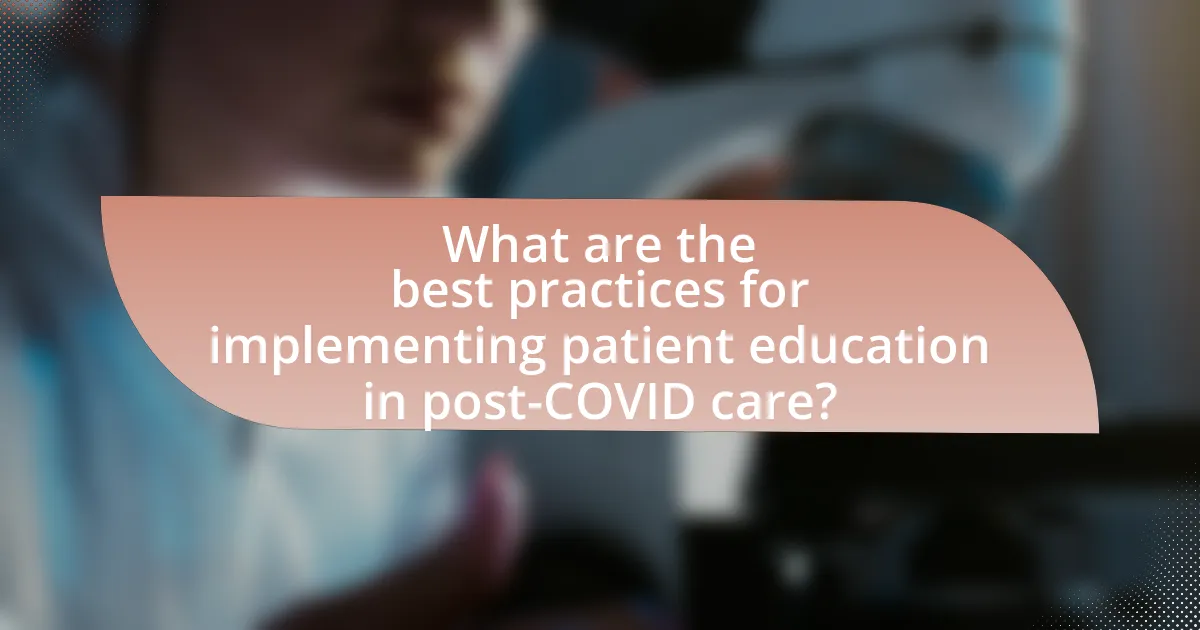
What are the best practices for implementing patient education in post-COVID care?
The best practices for implementing patient education in post-COVID care include personalized communication, utilizing digital platforms, and providing clear, evidence-based information. Personalized communication ensures that educational content is tailored to individual patient needs, enhancing understanding and engagement. Utilizing digital platforms, such as telehealth and mobile applications, allows for accessible and timely information delivery, which is crucial in a post-COVID context where in-person visits may be limited. Providing clear, evidence-based information helps patients make informed decisions about their health, as studies indicate that well-informed patients are more likely to adhere to treatment plans and manage their conditions effectively.
What methods can be used to deliver patient education effectively?
Effective methods to deliver patient education include the use of multimedia resources, personalized communication, and interactive tools. Multimedia resources, such as videos and infographics, cater to various learning styles and enhance understanding. Personalized communication, which involves tailoring information to the individual patient’s needs and preferences, has been shown to improve retention and engagement. Interactive tools, such as mobile applications and online platforms, facilitate ongoing education and allow patients to access information at their convenience. Research indicates that these methods significantly increase patient comprehension and adherence to treatment plans, ultimately leading to better health outcomes.
How can technology enhance patient education efforts?
Technology can enhance patient education efforts by providing accessible, interactive, and personalized learning experiences. Digital platforms, such as mobile apps and online portals, allow patients to access educational materials tailored to their specific health conditions and treatment plans. For instance, a study published in the Journal of Medical Internet Research found that patients using mobile health applications reported improved understanding of their health conditions and increased engagement in their care. Additionally, telehealth services facilitate real-time communication between healthcare providers and patients, enabling immediate clarification of medical information and fostering a supportive learning environment. These technological advancements not only improve knowledge retention but also empower patients to take an active role in their health management.
What role do support groups play in patient education?
Support groups play a crucial role in patient education by providing a platform for sharing experiences, knowledge, and coping strategies among individuals facing similar health challenges. These groups facilitate peer-to-peer learning, where members can discuss treatment options, symptom management, and emotional support, enhancing their understanding of their conditions. Research indicates that participation in support groups can lead to improved health outcomes, as patients gain insights from others who have navigated similar situations, thereby increasing their confidence in managing their health. For instance, a study published in the Journal of Psychosomatic Research found that patients engaged in support groups reported higher levels of satisfaction with their care and better adherence to treatment plans.
What common pitfalls should be avoided in patient education?
Common pitfalls to avoid in patient education include using medical jargon, failing to assess patient understanding, and not tailoring information to individual needs. Medical jargon can confuse patients, leading to misunderstandings about their health conditions and treatment plans. Research indicates that patients who do not fully understand their diagnosis or treatment are less likely to adhere to medical advice, which can negatively impact health outcomes. Additionally, neglecting to assess a patient’s comprehension can result in misinformation being accepted as fact, further complicating their care. Tailoring information to meet the specific needs of each patient is crucial, as a one-size-fits-all approach often overlooks unique circumstances and preferences, diminishing the effectiveness of the education provided.
How can healthcare providers ensure they are not overwhelming patients with information?
Healthcare providers can ensure they are not overwhelming patients with information by prioritizing clear communication and tailoring the amount of information to the individual patient’s needs. This involves assessing the patient’s understanding and preferences, providing information in manageable segments, and using plain language to explain complex concepts. Research indicates that patients retain information better when it is presented in small, digestible pieces rather than all at once, which can lead to confusion and anxiety. For instance, a study published in the Journal of Health Communication found that patients who received information in a structured format reported higher satisfaction and better understanding of their health conditions.
What strategies can be employed to tailor education to individual patient needs?
To tailor education to individual patient needs, healthcare providers can employ personalized assessment, adaptive learning techniques, and culturally sensitive communication. Personalized assessment involves evaluating each patient’s unique health status, learning preferences, and barriers to understanding, which allows for customized educational content. Adaptive learning techniques, such as using interactive digital platforms, can adjust the complexity of information based on patient responses, ensuring comprehension. Culturally sensitive communication recognizes the diverse backgrounds of patients, enabling educators to present information in a relatable manner. Research indicates that personalized education improves patient engagement and outcomes, as evidenced by a study published in the Journal of Medical Internet Research, which found that tailored educational interventions significantly enhanced knowledge retention and self-management in chronic disease patients.
What practical tips can healthcare providers use to improve patient education in post-COVID care?
Healthcare providers can improve patient education in post-COVID care by utilizing clear communication strategies, leveraging digital tools, and providing tailored resources. Clear communication involves using simple language and avoiding medical jargon to ensure patients understand their health conditions and treatment options. Digital tools, such as telehealth platforms and educational apps, can facilitate access to information and support, allowing patients to engage with their care remotely. Additionally, providing tailored resources, such as personalized care plans and educational materials that address specific patient needs, enhances understanding and adherence to treatment protocols. These strategies are supported by studies indicating that effective communication and personalized education significantly improve patient outcomes and satisfaction in healthcare settings.
